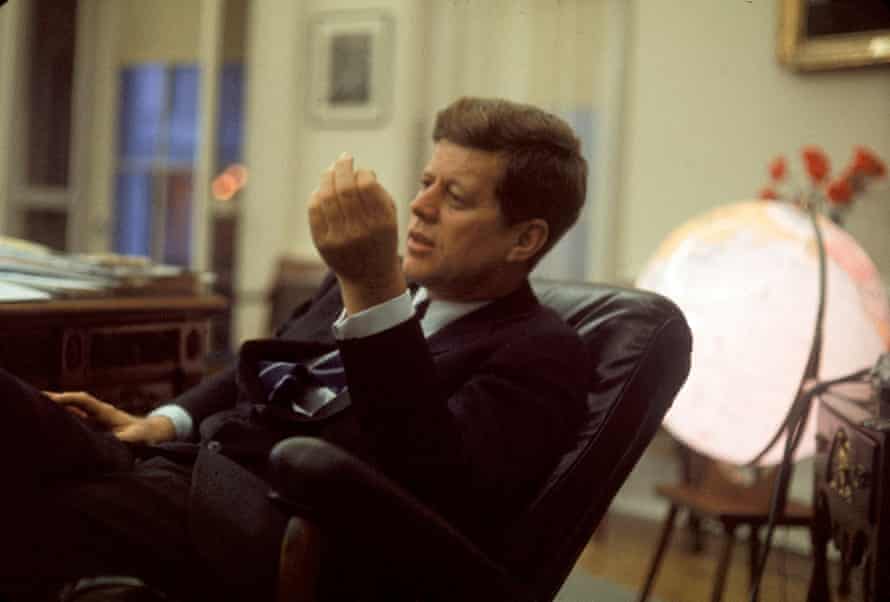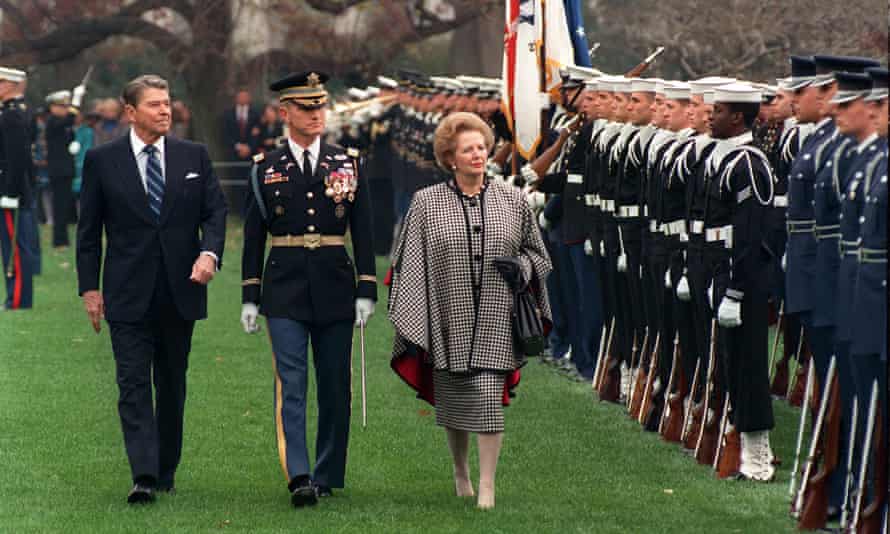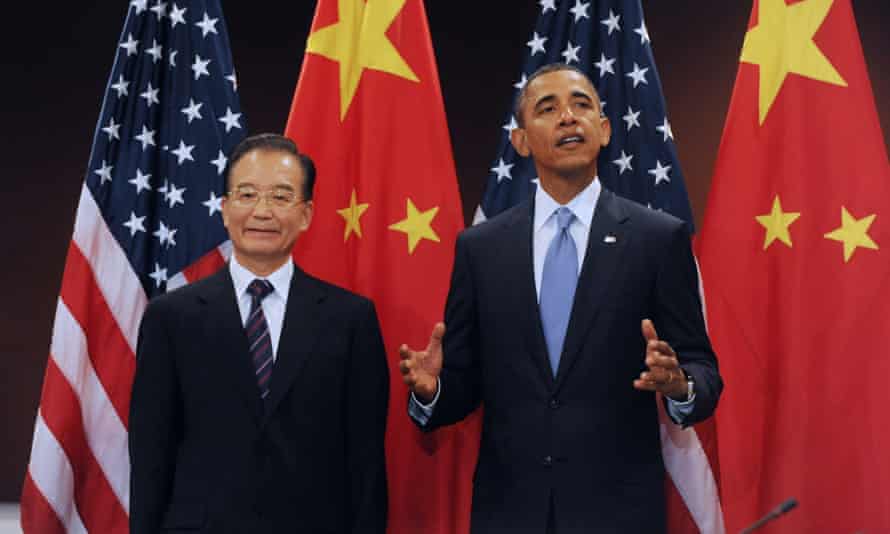Make America Great Again 100000 Times
"L ow-free energy Jeb". "Petty Marco". "Lyin' Ted". "Kleptomaniacal Hillary". Give Donald Trump credit: he has a memorable way with insults. His accept a style of carving themselves on the encephalon. And they've garnered media coverage, analysis and commentary near beyond imagining.
Memorable every bit they might be yet, they won't be what lasts of Trump's 2016 election run. That's surely reserved for a single slogan that volition sum upwardly his candidacy when it's all over (no affair how it ends). He arrived with information technology on that Trump Tower escalator in the get-go moments of his campaign, and it now headlines his website, where it's besides emblazoned on an array of products from hats to T-shirts.
You already know which line I mean: "Make America Groovy Again!"
That exclamation point ensures yous won't miss the hyperbolic, Trumpian nature of its promise to return the country to its former glory days. In information technology lies the essence of his campaign, of what he's promising his followers and Americans generally – and nonetheless, strangely plenty, of all his lines it'due south the one most taken for granted, the one that's been given the least idea and analysis. And that's a shame, considering information technology represents something new in our American age. The problem, I doubtable, is that what start catches the eye is the phrase "make America smashing" then, of grade, the exclamation point, while the single virtually important word in the slogan, historically speaking, is barely noted: again.
With that word, Trump crossed a line in American politics that until his escalator moment represented a kind of psychological taboo for politicians of whatever stripe and of either party, including presidents and potential candidates for that position. He is the outset American leader or potential leader of recent times not to experience the need or obligation to insist that the US, the "sole" superpower of Planet Earth, is an "exceptional" nation, an "indispensable" country, or even in an unqualified sense a "slap-up" one. His claim is the opposite: that, at nowadays, America is anything simply exceptional, indispensable or great, though he lonely could make it "peachy once again".
In that claim lies a marvel that, in a court of police, might be considered an admission of guilt. Yes, it says, if ane human being is allowed to enter the White Firm in January 2017, this could be a dissimilar state, merely – and herein lies the originality of the slogan – information technology is not slap-up at present.
Trump, in other words, is the first person to run openly and without amends on a platform of American turn down. Think about that for a moment. "Make America Great Once more!" is indeed an admission, in the grade of a boast.
As he tells his audiences repeatedly, America, the formerly corking, is today a punching bag for Red china, Mexico ... well, you know the pitch. Yous don't have to hold with him on the specifics. What's interesting is the overall vision of a country lacking in its erstwhile greatness.
Perhaps a niggling history of American greatness and presidents (as well as presidential candidates) is in gild here.
'Urban center upon a hill'

Once upon a time, in a distant America, the words "greatest", "exceptional" and "indispensable" weren't part of the political vocabulary.
American presidents didn't carp to merits any of them for this land, largely considering American wealth and global preeminence were and then indisputable. We're talking about the 1950s and early on 1960s, the post-2d earth state of war and pre-Vietnam "golden" years of American power. Despite a certain hysteria about the supposed dangers of domestic communists, few Americans then doubted the singularly unchallengeable ability and greatness of the state. Information technology was such a given, in fact, that information technology was simply too self-evident for presidents to cite, hail or praise.
So if yous look, for instance, at the speeches of John F Kennedy, you lot won't find them littered with exceptionals, indispensables or their equivalents.
In a pre-countdown speech he gave in January 1961 on the kind of government he planned to bring to Washington, for instance, he did cite the nativity of a "great republic" and quoted Puritan John Winthrop on the desirability of creating a country that would be "a city upon a colina" to the rest of the world, with all of humanity'due south eyes upon united states of america.
In his inaugural accost ("Ask non what your country can do for yous") he invoked a kind of unspoken greatness, saying: "Nosotros shall pay any price, behave whatever brunt, meet any hardship, back up any friend, oppose any foe to assure the survival and the success of liberty."
It was and so common to speak of the US with pride as a "free nation" (as opposed to the "enslaved" ones of the communist bloc) rather than an exceptional one. His merely utilise of "great" was to invoke the Usa-led and Soviet Marriage-led blocs as "two great and powerful groups of nations".
Kennedy could even fall back on a certain modesty in describing the US part in the globe (which in those years, from Republic of guatemala to Islamic republic of iran to Cuba, all too frequently did not conduct over into bodily policy), saying in one speech: "Nosotros must face the fact that the United States is neither almighty or omniscient – that we are simply 6% of the world's population – that we cannot impose our will upon the other 94% of mankind – that we cannot right every wrong or reverse each adversity – and that therefore at that place cannot exist an American solution to every earth problem." In that aforementioned speech, he typically spoke of America as "a cracking ability" – but not "the greatest power".
If you didn't grow upwards in that era, you may non grasp that none of this in whatsoever way unsaid a lack of national self-esteem. Quite the contrary: it implied a deep and abiding confidence in the overwhelming power and presence of this country, a confidence so unshakeable that there was no need to speak of it.
If you want a pop cultural equivalent for this, consider America's moving-picture show heroes of that time, actors such as John Wayne and Gary Cooper, whose westerns and, in the case of Wayne, state of war movies were iconic. What'south hit when you look back at them from the present moment is this: while neither of those actors was anything but an imposing figure, they were also remarkably ordinary looking. They were in no way over-muscled, nor were they over-armed in the modern way. It was only in the years after the Vietnam war, when the country had absorbed what felt like a grim defeat, been wracked past oppositional movements, riots and assassinations, when a full general sense of loss had swept over the polity, that the over-muscled hero, the exceptional killing car, made the scene. (Remember: Rambo.)
Consider this then if you want a definition of decline: when you have to state openly (and repeatedly) what previously had been also obvious to say, you lot're heading, as the opinion polls always like to phrase it, in the wrong direction; in other words, one time you have to say it, especially in an overemphatic way, you lot no longer accept it.
The Reagan reboot

That notation of defensiveness first crept into the American political lexicon with the unlikeliest of politicians: Ronald Reagan, the homo who seemed like the to the lowest degree defensive, most genial guy on the planet. On this subject at least, recollect of him as Trumpian before the advent of the Donald, or at to the lowest degree as the man who (thanks to his ad writers) invented the political use of the word "again". It was, afterward all, employed in 1984 in the seminal ad of his political run for a second term in function. While that bucolic-looking Idiot box commercial was titled "Prouder, Stronger, Better", its commencement line ever so memorably went: "Information technology's morning over again in America." ("Why would we always want to return to where we were less than four short years ago?")
Think of this as office of a mail-Vietnam Reagan reboot, a time when the U.s.a. in Rambo-esque style was quite literally muscling up and over-arming in a major style. Reagan presided over "the biggest peacetime defence build-upwardly in history" confronting what, referencing Star Wars, he called an "evil empire" – the Soviet Union. In those years he also worked to rid the country of what was then termed "the Vietnam syndrome" in function by rebranding that war a "noble cause".
In a time when loss and pass up were much on American minds, he dismissed them both, even equally he ready the country on a path toward the present moment of 1% dysfunction in a land that no longer invests fully in its own infrastructure, whose wages are stagnant, whose poor are a growth industry, whose wealth now flows eternally upward in a political environment awash in the money of the ultra-wealthy, and whose over-armed armed forces continues to pursue a path of endless failure in the greater Middle East.
Reagan, who spoke directly virtually American declinist thinking in his time – "Permit's reject the nonsense that America is doomed to decline" – was hardly shy about his superlatives when information technology came to this country. He didn't hesitate to re-channel classic American rhetoric, ranging from Winthop'due south "shining city upon a hill" (perhaps cribbed from Kennedy) in his farewell address to Lincoln-esque ("the final all-time promise of man on Earth") invocations such as "here in the heartland of America lives the hope of the earth" or "in a globe wracked by hatred, economic crisis and political tension, America remains mankind'southward best hope".
And yet in the 1980s at that place were still limits to what needed to be said nigh America. Surveying the planet, you lot didn't nevertheless have to refer to us as the "greatest" state of all or as the planet's sole truly "exceptional" state. Think of such repeated superlatives of our own moment every bit defensive markers on the declinist gradient. The at present commonplace adjective "indispensable" equally a stand up-in for American greatness globally, for example, didn't even arrive until Bill Clinton's secretarial assistant of state, Madeleine Albright, began using it in 1996.
It only became an indispensable role of the rhetorical arsenal of American politicians, from Barack Obama on downwardly, a decade into the 21st century, when the country's eerie dispensability (unless you were a junkie for failed states and regional chaos) became ever more apparent.
As for the United states being the planet's "exceptional" nation, a phrase that now seems indelibly part of the American grain and that no president or presidential candidate avoids, it's surprising how late information technology entered the lexicon.
As John Gans Jr wrote in the Atlantic in 2011: "Obama has talked more than well-nigh American exceptionalism than Presidents Reagan, George HW Bush-league, Beak Clinton, and George West Bush combined: a search on UC Santa Barbara'southward exhaustive presidential records library finds that no president from 1981 to today uttered the phrase 'American exceptionalism' except Obama."

As US News's Robert Schlesinger has also noted, "American exceptionalism" is not a traditional part of the presidential vocabulary. According to his search of public records, Obama is the only president in 82 years to use the term.
And withal in recent years it has get a commonplace of Republicans and Democrats akin. Equally the country has get politically shakier, the rhetoric nearly its greatness has but escalated in an American version of "the lady doth protest besides much". Such descriptors have become the political equivalent of litmus tests: you couldn't exist president or much of annihilation else without eternally testifying to your unwavering conventionalities in American greatness.
This, of course, is the line that Trump crossed in a curiously unnoticed fashion in this ballot campaign. He did so past initially upping the rhetorical dues, adding that assertion point (which even Reagan avoided). Yet in the process of being more patriotically correct than yard, he somehow also waded direct into American turn down and so bluntly that his own audience could hardly miss it – even if his critics did.
Recall of it as an irony, if you wish, but in promoting his own rising the ultimate American narcissist has also openly promoted a version of decline to striking numbers of Americans. For his followers, a major political figure has quit with the defensive BS and started maxim it the style information technology is.
Of course, don't furl the flag or shut downwards those offshore accounts or start writing the complete history of American decline quite all the same. After all, the Us still looms "lone" on an ever more chaotic planet. Its wealth remains stunning, its economic clout something to behold, its tycoons the green-eyed of the globe, and its military machine beyond compare when it comes to how much and how destructive, fifty-fifty if non how successful. All the same, make no mistake about it – Trump is a harbinger, withal baroque, of a new American century in which this state will indeed no longer be "the greatest" or, for all only a shrinking crew, exceptional.
Marker your calendars: 2016 is the yr the US first went public as a declinist ability, and for that you lot tin thank Donald (or rather Donald!) Trump.
Tom Engelhardt is a co-founder of the American Empire Project and the author of The United States of Fearfulness as well every bit a history of the common cold war titled The End of Victory Culture. He runs TomDispatch.com.
Source: https://www.theguardian.com/us-news/2016/apr/29/donald-trump-make-america-great-again-exceptionalism
0 Response to "Make America Great Again 100000 Times"
Post a Comment